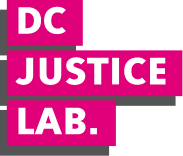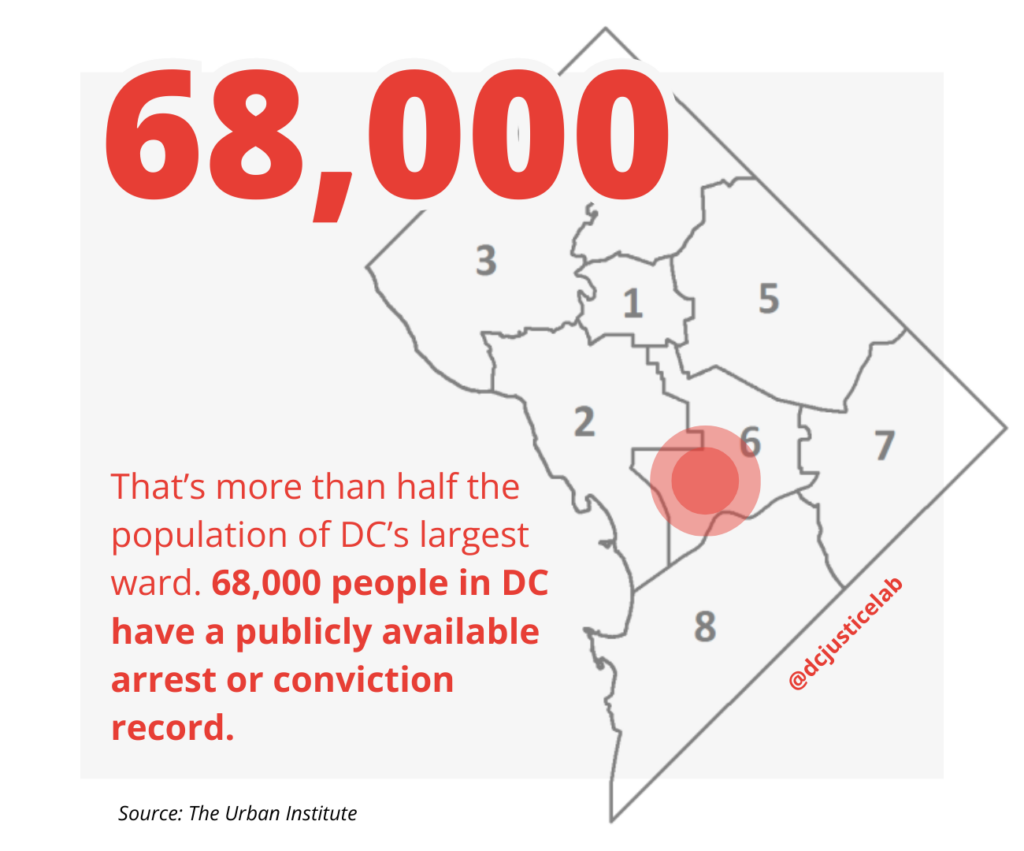
criminal record sealing and expungement
Arrest and conviction records are lifetime barriers to employment and housing.
- 3 Minute Read
One in seven DC residents have criminal records, and they face hundreds of laws, policies and practices that can prevent them from getting a job, finding housing, pursuing an education, and contributing to our community. The fairest and most effective way to fix this problem is to establish a process that automatically removes someone’s criminal record after a certain period of time. With the passage and implementation of the Second Chance Amendment Act of 2022, DC has taken some steps to give people convicted of most misdemeanors and some felonies an opportunity to petition the courts to have their criminal record sealed and expunged, and by October 2027, certain types of convictions and non-convictions will be automatically expunged. However, the new law still leaves some people without a way of removing an old record, and some individuals will still have to wait up to ten years for relief. DC should allow every person with a criminal record to have an opportunity to ask the court for relief, allow at least one felony conviction record to be eligible for automatic sealing, shorten the waiting periods for people to become eligible for criminal record sealing and expungement, and make the calculations of the waiting periods based on the date of conviction, not the date of sentencing.

What you need to know
Old criminal records present lifetime barriers to someone's mobility and stability.
Whether it was a conviction for a crime or an arrest that never led to a formal finding in court, criminal records remain on public databases for years. Hundreds of policies and practices in the District can prevent someone with a criminal record from succeeding economically or in other aspects of life: Nearly 7 in 10 people with a felony conviction said it made it more difficult to get a job, and nearly 6 in 10 said it was more difficult to find housing. Even a record of an arrest that did not lead to a conviction can limit callbacks for employment and cause individuals to drop out of the formal labor market. People with records report that because employers know that they have limited options, they are more likely to be underpaid, and face harassment. These barriers increase the likelihood of people engaging in the informal economy and ending up back in the criminal legal system.
DC’s “Ban the Box” laws do not offer enough protection.
Policymakers recognize the negative impact a criminal record can have on someone’s economic success. The city and the federal government have taken some steps to restrict when inquiries about past criminal records are allowed in a hiring process or when accessing public or private housing. But these “ban the box”-type laws only target a few of the restrictions, and most people and employers do not know these laws exist, While there are 68,000 people with criminal records in DC, the DC auditor reported that only 417 people filed complaints under the ban the box law claiming discrimination in the employment process. The auditor showed, only 25 percent of employers were familiar with the “ban the box” law. One study on “ban the box” found that it actually increased racial discrimination in the hiring process, as employers may make assumptions about someone’s criminal justice involvement based on their race.
Black residents are disproportionately burdened by old criminal records.
While all residents experience the impact of a weaker economy because of old records, they are more likely to limit Black earnings, wealth, and success in the job market. Black people are nearly twice as likely to be arrested compared to other residents. Black people in DC are six times more likely than white residents to be unemployed, and the net worth of a typical white family is 81 times that of a typical Black family.
DC passed record sealing and expungement legislation, which began taking effect in March 2025.
The Second Chance Amendment Act of 2022, enacted unanimously by the Council of the District of Columbia, is legislation that seeks to expand record sealing and expungement opportunities for people with old criminal records. Starting on March 1st, people convicted of misdemeanors and certain felonies can seal their records by filing a petition with the court and demonstrating that it is in the interests of justice to do so. After a person is convicted of a crime, a person must wait 5 years for misdemeanors and 8 years for certain felonies before they can petition the court to seal their record. By October 2027, some types of convictions and non-convictions will be automatically sealed or expunged within 90 days. Records of non-convictions, for example, no papers, dismissals, and acquittals, will be sealed automatically after 10 years but can be expunged earlier if the person successfully demonstrates actual innocence.
DC's current record sealing and expungement law falls short of extending relief.
While the Second Chance Amendment Act of 2022 is an important step forward, the law falls short in extending relief from the impact of old criminal records in a number of ways. All offenses should be eligible for some type of record sealing and expungement so that all individuals have an incentive to work towards a “clean slate” and second chance. Extending eligibility to all would also remove the tactics prosecutors sometimes use by charging a crime that one couldn’t seal or expunge, coercing them to take a plea that they wouldn’t otherwise take. Additionally, the waiting periods to seek relief by motion (5 years for misdemeanor convictions and 8 years for felonies) are too long, and the waiting periods should be calculated based on the date of conviction, not the date of sentencing. Unless further changes are made, the court clerks who need to know when someone’s eligibility will have a harder time retrieving this information about the end of statement from other stakeholders responsible for supervision in DC.
WHERE TO LEARN MORE
Council of the District of Columbia Justice and Public Safety Committee March 2023
Collateral Consequences Resource Center March 2023
Council of the District of Columbia debate on this topic begins at 2:27:50 February 6th, 2024
Criminology February 2024
Collateral Collateral Consequences Resource Center March 2022
Harvard Law Review June 2020
DC Auditor June 2016
Alliance for Safety and Justice June 2016
The Brennan Center September 2020
The Quarterly Journal of Economics February 2018
Our Solutions
DC should expand the opportunities for criminal record sealing and expungement by:
- Allowing every person with a criminal record to have an opportunity to ask the court for relief
- Allowing at least one felony conviction record to be eligible for automatic sealing
- Shortening the waiting periods for people to become eligible for criminal record sealing and expungement
- Making the calculations of the waiting periods based on the date of conviction, not the date of sentencing
- Recognizing people with criminal records as a protected class under the DC Human Rights Code
special thanks
Sarah Bradach ★ Jon Carter ★ Emily Cassometus



